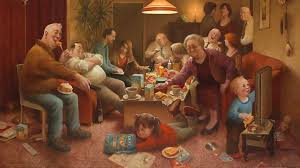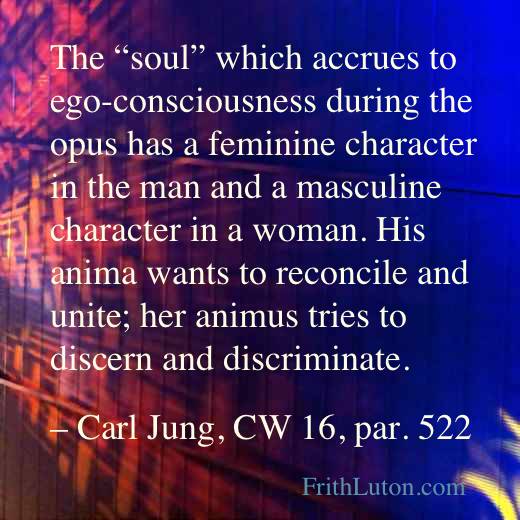
A woman has a dream; one of a series regarding men. Those peopling her dream series are fathers, sons, brothers, bosses and husband. The dreams, as is usually the case, are structured around ‘daytime residue’, for example things that have happened during the daylight hours either in reality, on TV, or in the news. The latest dream:
It is daytime and the woman is in a large car-park, in the driving seat of a spacious dark saloon car with her husband in the passenger seat. A small, aggressive man, who owns the establishment adjoining the car park, parks his car across the front of her car and struts off to what emerges as a pub. His car is an old ‘E’ registered cream-coloured car in mint condition. Unintentionally, and seemingly of its own volition, her car gently rolls forward and collides with the man’s car. Across every panel of his car there is now a black line. The woman groans inwardly and disappears from the dream as she has to be somewhere else. When she comes back to the situation, her husband has dealt with everything. The bill is £411.73 and he is in a good mood and happy to get going.

One Man: The woman describes this man as small and aggressive. He could represent an immature version of masculinity. She associates him with the men of her childhood: mouthy, uncouth, pushy, loud and aggressive. They were dangerous men and she had to be on her guard when they were about. She had to stand up for herself or she would be bullied, pushed around and taken advantage of. Drinking and violence featured in her childhood; her Dad was always going to the pub. Moreover, he once owned a cream-coloured car that was his pride and joy. She remembered him driving it round to their relatives to show off. She couldn’t make anything of the ‘E’ registration. She looked it up and it was a 1987 registration. Of note, is that it was blocking her way out.
Another man: This is the woman’s husband. She has a good marriage and very positive associations to him. He is tall and clever. He doesn’t say a word in the dream, communication is telepathic (in fact neither man speaks). He is the ‘strong, silent type’. He doesn’t engage with conflict, but stays close to the facts and is practical in sorting things out. He doesn’t blame her for the accident; it is of interest that she is in the driving seat, but he has taken the initiative to resolve the situation. He has sought out the other man and somehow a figure has been settled on and the bill is paid. A well-liked man, her husband is usually to be found in the background.
The woman has had contact with her family of origin over the Christmas period and there has been disagreement between her and her sister.

The dream shows two different ways of behaving to resolve this. One way is pushy and aggressive. The other way is quieter, non-conflictual and practical. The polarity between these two male dream figures forms a tension and the woman sees that she can behave in either way herself, though there would be a push towards one man if she is with family members, since this is a well-established pattern in the family. She can, however opt for the second version modelled on her husband.

Jung describes the animus as the unconscious, masculine side of a woman. The animus is the animating force and provides a bridge between the personal and the collective. The personal unconscious in her case is laid down in her formative years, so that the way her father and the males in her family behaved provides her with an unconscious pattern. This is symbolized by one man. His masculine energy is unsafe and uncontained. It can overwhelm her psyche. Primitive animus behaviour in a woman can be expressed in a long list of negative qualities: bossy; know-it-all; bullying; sadistic; controlling; loud; and with an inability to meaningfully relate to other people or indeed other parts of herself. To her shame, the woman has to admit to herself that she has been all of these things at various times, even though she has a well-established persona that is none of these.
Jung describes the animus as a complementary and compensating function that the unconscious uses to redress one-sidedness which he would understand as her consciously lived femininity. For Jung, the psyche strives for completeness so every woman needs to develop her masculine qualities as well as her socially prescribed femininity. In our current age, where gender is much more fluid, post-Jungians tend to think more in terms of developing the contra-psychological so whichever side of the personality is less dominant will need attending to in order to grow, thereby allowing the whole personality to flourish. Like a good marriage, there is complementarity which Jung describes as syzygy.

In this dream, psyche is showing in another man a supportive animus function. He is demonstrating a well-developed, mature, integrated animus. Traditionally, this is seen as a list of positive qualities: good rational and logical ability; capacity for clear, non-attached thought; ability to apply sustained effort and application; a strong centre; good external strength in the persona; and a bridge between knowledge and creative thinking. The woman is soothed as she considers this version of herself and takes heart from the fact that she has married a good man (though not perfect)! who personifies many of these qualities that she can learn from.
The point of development is that once her dream has brought these opposites to her attention, then she is in a position to choose wisely who and how to be. This is confirmed a few nights later when she has a dream, full of joy and fullness, that she is pregnant. This symbolizes new life and confirms that ‘a conception’ or new psychic creation has taken place.
